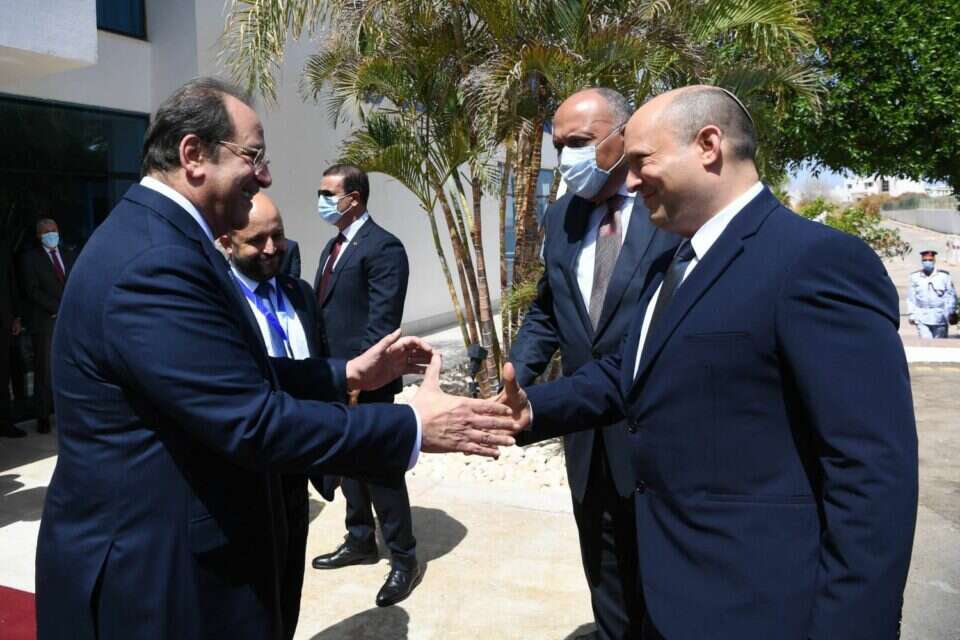The official announcement of the Bennett and al-Sisi meeting yesterday in Sharm el-Sheikh brought together many topics: cooperation between the countries, trade agreements and regional and international issues.
All of these were indeed discussed, but the main and most important issue at the meeting was intense. It is clear to both sides that the situation in the south is explosive, on the verge of a violent outbreak. Although Egypt has invested up to its neck in the mediation efforts between the parties, and has at times managed to calm things down in recent months, it now seems that its challenge is greater than before. This is due to the accumulation of unrelated events. Hamas is very frustrated by its failure to capitalize on the Wall Guard operation. Although the volume of goods transferred to the Gaza Strip and fishing grounds has increased in recent days at the request of Egypt (also as a gesture of goodwill ahead of the leaders' meeting), the transfer of funds encounters problems after the Palestinian Authority withdrew its agreement to pay salaries to Hamas officials in Gaza.
The result is growing resentment in Hamas, which as always is channeled into violence.
Yahya Sinwar does not want to break the tools at this stage, so he chooses relatively "soft" violence: incendiary balloons and clashes on the fence.
Hamas currently contains the Air Force's response attacks, but it is not certain that it will do so in the long run.
At the same time, Islamic Jihad also seeks to seize an opportunity against the background of the escape of prisoners from Gilboa Prison.
For three days in a row, the organization has been launching a rocket at Sderot every evening, in solidarity with the fugitives and the struggle of Palestinian prisoners in prisons, whose conditions of incarceration are now expected to worsen.
As part of this, the possibility of stopping the organizational division into cells and wings was discussed, which provokes much anger among the inmates who have already warned that they will go on hunger strike.
The jihad in Gaza was guarded not to break the tools
The jihad in Gaza seeks to deter Israel from such marches.
In the meantime he too has been kept from breaking the tools, but he may change his policy in case the two prisoners who have not yet been captured are killed during their arrest.
Israel will not be able to contain such an escalation, and may choose to focus its campaign only on Islamic Jihad, as it did during Operation Black Belt in November 2019, which began the assassination of a senior member of the Gaza Strip, Bahá'u'lláh.
But then Hamas chose to sit on the fence and not fight Israel.
Now his situation is more complicated: he will find it difficult to restrain himself when the reason is the Palestinian prisoners.
This is a matter of consensus on the Palestinian street, and Sinwar himself is a former prisoner who was released in the Shalit deal, and who has often sworn to do everything to free his friends who are left behind.
Hamas, on the other hand, is not interested in another campaign, and Sinwar also knows that he may pay for it with his life.
This is where the Egyptians come into the picture.
It is likely that in the coming days they will look for formulas that will calm the situation.
Israel, meanwhile, refuses any formula that does not first address the issue of prisoners and missing persons (Coordinator Yaron Blum even accompanied the Prime Minister's visit to Egypt yesterday), a matter that currently seems insoluble in light of the current prisoner crisis.
And if tensions in the south are not enough, the West Bank and East Jerusalem have also seen an increase in the number of terrorist attacks and violence in recent days.
The stabbing attack on Jaffa Street in Jerusalem was thwarted yesterday thanks to the vigilance of civilians and the rapid and decisive functioning of the Border Police, but we can learn from him that the area is boiling.
Security forces have been practicing dealing with similar waves of terrorism in recent years.
Again, the solution is a combination of intelligence and deterrence, mainly by a massive deployment of forces on the ground.
If the terrorists shatter soldiers and not civilians, and especially if they fail to kill, it is likely that the current wave will also subside.
This will only happen after the last two escaped prisoners are also captured, and again - subject to their being arrested alive.
It is likely that Israel will also seek to maintain proportionality in its responses and activity in these explosive days, so as not to worsen the situation.
The rockets and balloons from Gaza will be answered with air force attacks, but these have no equation.
As long as the glass is not full, Israel has no interest in escalation, certainly when in the background the girls are with the Egyptians, in order to give them time and a chance to calm the spirits.
From past experience, the chances of this happening are slim - and the conclusion is clear.

